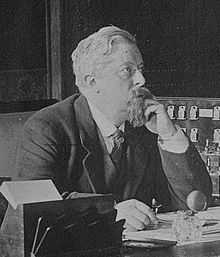Jules-Louis Breton
From Wikipedia, the free encyclopedia
For the French Realist painter, see Jules Breton.

Jules-Louis Breton (1872-1940).
Jules-Louis Breton (1 April 1872 – 2 August 1940) was a chemist-inventor and a French politician. He was a representative of the French Assembly, and the proponent of the Breton-Pretot machine, a wire-cutting armoured vehicle developed in France from November 1914. The vehicle was developed with M. Pretot, engineer.[1]
Breton was born in Courrières, Pas-de-Calais. He was a Socialist with Anarchist tendencies, and as a Natalist, endeavoured to giving more freedom to women.[2]
During World War I he was France's Undersecretary of State for Inventions.[3] and later founded and directed the National Research and Invention Ministry.[2]
He was also Minister of Hygiene under President Millerand in 1920.[4]
Notes
- ↑ Gougaud, p.104
- ↑ 2.0 2.1 Irresistible empire by Victoria De Grazia p.426
- ↑ Irresistible empire by Victoria De Grazia p.426
- ↑ Maternity and gender policies by Gisela Bock p.153
References
- Alain Gougaud L'Aube de la Gloire, Les Autos-Mitrailleuses et les Chars Français pendant la Grande Guerre, 1987, Musée des Blindés, ISBN 2-904255-02-8
|
This article is issued from Wikipedia. The text is available under the Creative Commons Attribution/Share Alike; additional terms may apply for the media files.